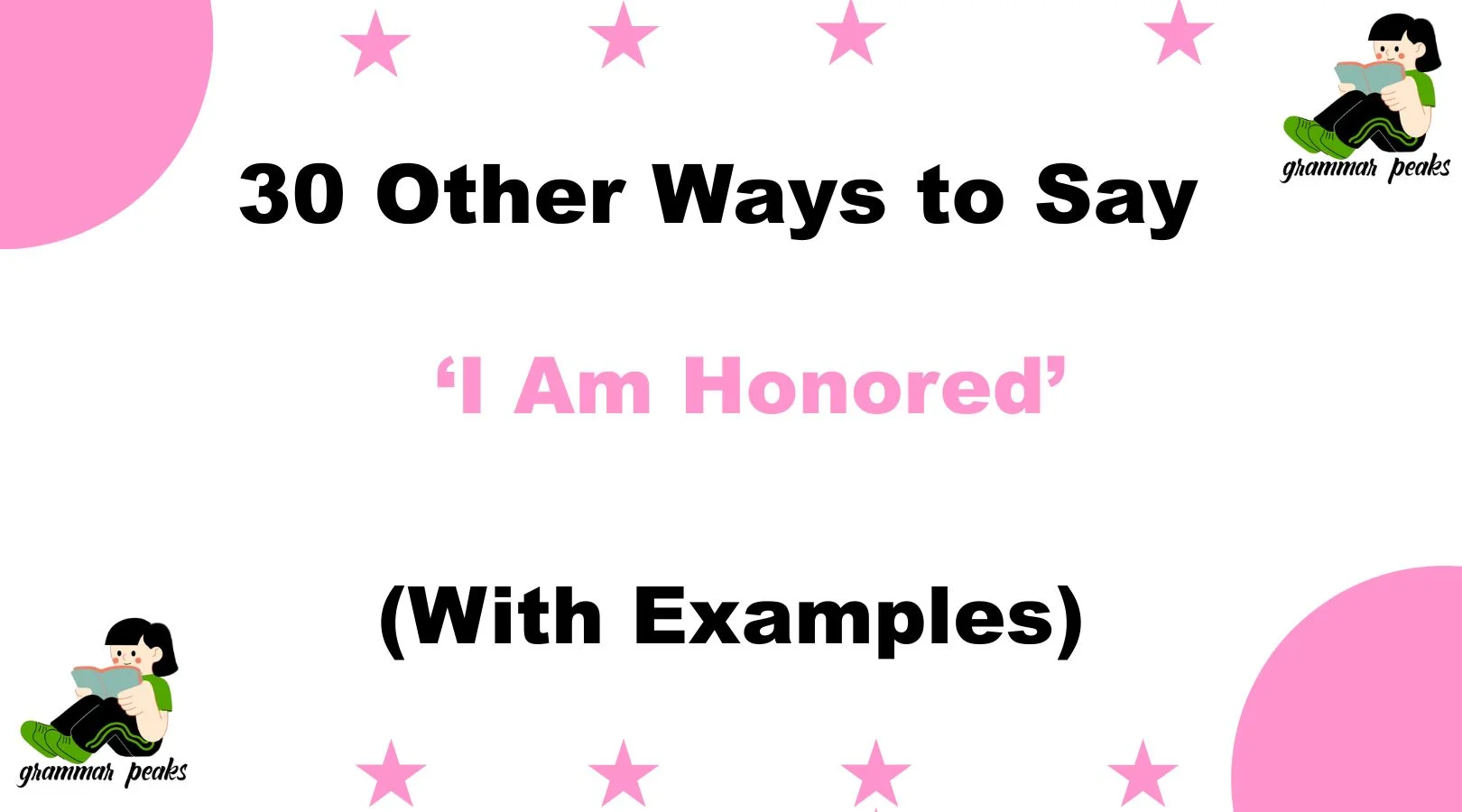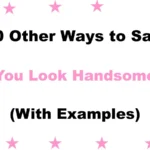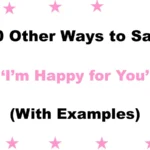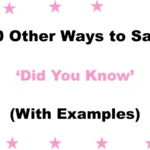Finding the right words to express genuine appreciation and respect is important. Saying “I am honored” conveys deep gratitude, but sometimes you want to make your message feel even more personal and heartfelt. Using thoughtful alternatives can show warmth, sincerity, and care, helping you connect better with the person you’re speaking to.
Whether in professional settings, personal notes, or special occasions, these phrases add variety and meaning. This article explores 30 meaningful ways to say “I am honored,” with explanations and examples to help you communicate with confidence and kindness.
What Does “I Am Honored” Mean?
To say “I am honored” means you feel privileged or deeply grateful for an opportunity, recognition, or trust someone has given you. It reflects respect and appreciation for the situation or relationship.
When to Use “I Am Honored”
Use “I am honored” when you want to express sincere gratitude for something meaningful—like receiving an award, being invited to a special event, or being trusted with a responsibility. It’s perfect for moments when you want to show humility and respect.
Is It Professional/Polite to Say “I Am Honored”?
Yes, “I am honored” is both professional and polite. It fits well in formal communications such as speeches, emails, thank-you notes, and meetings. Using it correctly conveys respect without sounding overly formal or stiff.
Pros and Cons of Saying “I Am Honored”
Pros:
- Shows humility and gratitude
- Suitable for many occasions
- Sounds respectful and thoughtful
Cons:
- Can sound repetitive if overused
- Sometimes feels too formal in casual settings
- Might come across as generic without personalization
Synonyms for “I Am Honored”
- I’m deeply grateful
- It’s a privilege
- I feel truly blessed
- I’m humbled
- I appreciate this sincerely
- I’m touched
- I’m thankful beyond words
- It’s an honor to be recognized
- I feel privileged to receive this
- I’m sincerely grateful
- I’m honored and humbled
- I’m filled with gratitude
- This means a lot to me
- I’m thankful for the opportunity
- I’m grateful for this recognition
- I’m touched and thankful
- I’m truly appreciative
- It’s a great honor
- I’m thankful from the bottom of my heart
- I’m deeply honored
- I’m grateful for this privilege
- I’m honored to accept
- I appreciate this opportunity
- I’m thankful and honored
- It’s humbling to be acknowledged
- I’m sincerely honored
- I’m grateful and humbled
- This recognition is very meaningful to me
- I’m honored beyond words
- I’m thankful for this honor
1. I’m Deeply Grateful
Definition: Expressing strong thankfulness with heartfelt emotion.
Detailed Explanation: This phrase emphasizes a deep, personal appreciation beyond a simple thank-you. It conveys that the honor has touched you profoundly.
Scenario Example: “I’m deeply grateful for the trust you’ve placed in me with this role.”
Best Use: When you want to express sincere, strong gratitude in both formal and informal settings.
Worst Use: Avoid using if the context is very casual or playful—it might sound too intense.
Tone: Warm, sincere, and respectful.
2. It’s a Privilege
Definition: Recognizing a special right or advantage given to you.
Detailed Explanation: This phrase highlights that you see the opportunity or recognition as something special and not taken for granted.
Scenario Example: “It’s a privilege to serve on this committee.”
Best Use: When acknowledging responsibilities or roles that come with trust or esteem.
Worst Use: Might sound too formal or stiff in casual conversations.
Tone: Respectful and formal.
3. I Feel Truly Blessed
Definition: Feeling fortunate or favored in a meaningful way.
Detailed Explanation: Often conveys a spiritual or emotional appreciation, adding a sense of heartfelt wonder to the gratitude.
Scenario Example: “I feel truly blessed to have such supportive colleagues.”
Best Use: Suitable for personal or heartfelt acknowledgments.
Worst Use: Avoid in strictly professional or secular contexts where “blessed” might feel out of place.
Tone: Warm, emotional, and personal.
4. I’m Humbled
Definition: Feeling modest or unassuming about receiving recognition.
Detailed Explanation: This expresses that you do not take the honor lightly and see it as an encouragement to continue growing.
Scenario Example: “I’m humbled to receive this award among such talented peers.”
Best Use: Formal or semi-formal events where showing modesty is valued.
Worst Use: May seem insincere if overused or in casual chats.
Tone: Respectful and modest.
5. I Appreciate This Sincerely
Definition: A straightforward expression of genuine thanks.
Detailed Explanation: It conveys honest and heartfelt appreciation without exaggeration.
Scenario Example: “I appreciate this sincerely and will do my best to live up to it.”
Best Use: Business emails, thank-you notes, or acknowledgments.
Worst Use: May feel bland if used repeatedly.
Tone: Honest and professional.
6. I’m Touched
Definition: Emotionally moved or affected by the honor.
Detailed Explanation: Suggests that the recognition has made a personal impact on your feelings.
Scenario Example: “I’m touched by your kind words and support.”
Best Use: When the honor has a personal or emotional significance.
Worst Use: Not ideal in very formal or business-only contexts.
Tone: Warm and emotional.
7. I’m Thankful Beyond Words
Definition: So grateful that words alone cannot fully express it.
Detailed Explanation: Emphasizes deep gratitude that feels too big for simple phrases.
Scenario Example: “I’m thankful beyond words for this incredible opportunity.”
Best Use: When you want to stress the depth of your appreciation.
Worst Use: Can seem overly dramatic if used in casual settings.
Tone: Emotional and heartfelt.
8. It’s an Honor to Be Recognized
Definition: Acknowledging the value of the recognition received.
Detailed Explanation: Shows that you value the acknowledgment and feel respect for it.
Scenario Example: “It’s an honor to be recognized among such esteemed companies.”
Best Use: Professional settings or award ceremonies.
Worst Use: Avoid if the tone needs to be casual or informal.
Tone: Formal and respectful.
9. I Feel Privileged to Receive This
Definition: Feeling fortunate to be chosen or honored.
Detailed Explanation: Indicates that you see the recognition as a special gift or opportunity.
Scenario Example: “I feel privileged to receive this award and will cherish it.”
Best Use: When accepting awards, titles, or roles.
Worst Use: May sound too formal for casual thanks.
Tone: Respectful and grateful.
10. I’m Sincerely Grateful
Definition: Genuine and honest gratitude.
Detailed Explanation: Reinforces that your appreciation is heartfelt and not just polite.
Scenario Example: “I’m sincerely grateful for your mentorship and support.”
Best Use: Both formal and informal expressions of thanks.
Worst Use: Overuse might reduce impact.
Tone: Warm and honest.
11. I’m Honored and Humbled
Definition: Acknowledges both gratitude and humility in response to recognition.
Detailed Explanation: This phrase conveys that you appreciate the honor but remain modest about it. It’s a balanced and respectful expression.
Scenario Example: “I’m honored and humbled to be chosen for this role.”
Best Use: Professional or public acknowledgments.
Worst Use: Avoid in overly casual settings—it may sound too formal.
Tone: Respectful, gracious, and modest.
12. I’m Filled with Gratitude
Definition: A strong expression of deep and overwhelming thankfulness.
Detailed Explanation: This communicates a sincere, almost emotional level of appreciation.
Scenario Example: “I’m filled with gratitude for the opportunity to serve this team.”
Best Use: Ideal for speeches, farewell messages, or heartfelt statements.
Worst Use: Can sound too intense in quick, casual replies.
Tone: Warm, emotional, and expressive.
13. This Means a Lot to Me
Definition: Shows that the gesture or honor has significant personal value.
Detailed Explanation: It’s simple but genuine and conveys a sense of heartfelt appreciation.
Scenario Example: “This means a lot to me—thank you for believing in me.”
Best Use: Personal messages, informal or formal thank-yous.
Worst Use: Avoid in very formal speeches—it can sound too conversational.
Tone: Sincere and personal.
14. I’m Thankful for the Opportunity
Definition: Gratefully recognizing the chance or trust you’ve been given.
Detailed Explanation: A great way to show gratitude when someone entrusts you with a task or role.
Scenario Example: “I’m thankful for the opportunity to contribute to this project.”
Best Use: Emails, meetings, or thank-you notes in professional settings.
Worst Use: May seem too general without specifics.
Tone: Professional, appreciative.
15. I’m Grateful for This Recognition
Definition: Thanking someone specifically for acknowledging your effort or contribution.
Detailed Explanation: It highlights that you see the recognition as meaningful and affirming.
Scenario Example: “I’m grateful for this recognition and will continue striving to do my best.”
Best Use: Awards, acknowledgments, and formal speeches.
Worst Use: In private, casual texts—it may seem overly formal.
Tone: Professional and heartfelt.
16. I’m Touched and Thankful
Definition: A blend of emotional appreciation and sincere gratitude.
Detailed Explanation: Useful when you want to show that the gesture made a personal impact.
Scenario Example: “I’m touched and thankful for your kind words.”
Best Use: Personal thank-yous, notes, or when someone gives you heartfelt praise.
Worst Use: Avoid in technical or strictly professional contexts.
Tone: Warm and emotional.
17. I’m Truly Appreciative
Definition: Genuinely thankful and acknowledging it clearly.
Detailed Explanation: A slightly more formal alternative that still feels natural.
Scenario Example: “I’m truly appreciative of the trust you’ve placed in me.”
Best Use: Work communications, client messages, or formal events.
Worst Use: May sound too stiff in casual conversations.
Tone: Polished and sincere.
18. It’s a Great Honor
Definition: Expresses that the recognition is highly valued and respected.
Detailed Explanation: A very formal way to state appreciation for something prestigious or important.
Scenario Example: “It’s a great honor to speak before you today.”
Best Use: Speeches, professional ceremonies, or media interviews.
Worst Use: May feel too grandiose in small personal situations.
Tone: Formal and respectful.
19. I’m Thankful from the Bottom of My Heart
Definition: A highly emotional way of expressing deep gratitude.
Detailed Explanation: Shows that you are sincerely and personally moved.
Scenario Example: “I’m thankful from the bottom of my heart for your support.”
Best Use: Personal messages, emotional thank-yous, and close relationships.
Worst Use: In corporate or business settings—it may be too sentimental.
Tone: Emotional, heartfelt, and warm.
20. I’m Deeply Honored
Definition: A strong version of “I am honored” emphasizing sincerity.
Detailed Explanation: Conveys a deeper level of appreciation, especially for prestigious recognition.
Scenario Example: “I’m deeply honored to receive this lifetime achievement award.”
Best Use: Awards, public addresses, or formal interviews.
Worst Use: Avoid informal chats.
Tone: Formal and respectful.
21. I’m Grateful for This Privilege
Definition: Thankful for being given something rare or special.
Detailed Explanation: This phrase places focus on the trust or access granted to you.
Scenario Example: “I’m grateful for this privilege to work on such an important cause.”
Best Use: Leadership roles, exclusive invitations, or unique opportunities.
Worst Use: Can sound exaggerated if the privilege is small.
Tone: Gracious and humble.
22. I’m Honored to Accept
Definition: A formal and respectful way to accept an offer or recognition.
Detailed Explanation: A direct phrase to use during award acceptances or formal responses.
Scenario Example: “I’m honored to accept this invitation and represent our team.”
Best Use: Event speeches, award acceptances, or formal communications.
Worst Use: Too formal for emails or casual thank-yous.
Tone: Formal and polished.
23. I Appreciate This Opportunity
Definition: Recognizing and valuing the chance you’ve been given.
Detailed Explanation: Simple, clear, and suitable for almost any situation.
Scenario Example: “I appreciate this opportunity and look forward to contributing.”
Best Use: Interviews, team introductions, or new job emails.
Worst Use: May sound vague without elaboration.
Tone: Professional and polite.
24. I’m Thankful and Honored
Definition: Combines both gratitude and respect in one phrase.
Detailed Explanation: A balanced statement of being thankful while recognizing the significance of the moment.
Scenario Example: “I’m thankful and honored to receive your support.”
Best Use: Suitable for formal events and thank-you messages.
Worst Use: Not ideal for very casual or brief notes.
Tone: Respectful and warm.
25. It’s Humbling to Be Acknowledged
Definition: Feeling modest and appreciative of the recognition.
Detailed Explanation: Shows that you’re not taking the honor lightly and that it means something personal.
Scenario Example: “It’s humbling to be acknowledged among such great talent.”
Best Use: Speeches, interviews, and public statements.
Worst Use: Can seem dramatic in small-scale situations.
Tone: Modest and respectful.
26. I’m Sincerely Honored
Definition: A genuine expression of being pleased and grateful.
Detailed Explanation: Similar to “I am honored,” but adds a personal touch of sincerity.
Scenario Example: “I’m sincerely honored to be part of this project.”
Best Use: Formal but heartfelt emails or event speeches.
Worst Use: May sound stiff if not delivered with warmth.
Tone: Professional and genuine.
27. I’m Grateful and Humbled
Definition: Combines feelings of appreciation and modesty.
Detailed Explanation: Expresses deep respect while acknowledging the significance of the moment.
Scenario Example: “I’m grateful and humbled by your trust.”
Best Use: Recognition events, team promotions, or leadership roles.
Worst Use: Might feel overused in repetitive corporate communication.
Tone: Warm and respectful.
28. This Recognition Is Very Meaningful to Me
Definition: Indicates that the acknowledgment has personal significance.
Detailed Explanation: Moves beyond politeness to express real emotional impact.
Scenario Example: “This recognition is very meaningful to me, and I’m thankful for it.”
Best Use: Retirement speeches, farewell notes, or heartfelt statements.
Worst Use: May feel too emotional in high-stakes business pitches.
Tone: Personal and thoughtful.
29. I’m Honored Beyond Words
Definition: Feeling so honored that it’s hard to express in language.
Detailed Explanation: Highlights the depth of your appreciation in a poetic way.
Scenario Example: “I’m honored beyond words to receive this award.”
Best Use: Emotional, once-in-a-lifetime acknowledgments.
Worst Use: In minor or routine recognition—it may sound exaggerated.
Tone: Dramatic, heartfelt, and formal.
30. I’m Thankful for This Honor
Definition: A direct and clear expression of appreciation.
Detailed Explanation: Combines the elements of thankfulness and acknowledgment of importance.
Scenario Example: “I’m thankful for this honor and look forward to the work ahead.”
Best Use: Speeches, letters, formal announcements.
Worst Use: May sound too formal in friendly texts or chats.
Tone: Gracious, polished, and respectful.
Conclusion
Choosing the right words can turn a simple thank-you into a heartfelt and lasting message. Whether you’re speaking in front of a crowd or writing a thoughtful email, these 30 alternatives to “I am honored” help you express sincerity, humility, and appreciation in ways that truly resonate. Language has power, and the way we say “thank you” can reflect who we are and what we value. Use these phrases as tools to communicate with care, warmth, and meaning.
FAQs
1. What is the best alternative to “I am honored” in a professional email?
The best alternative often depends on tone and context. For professional emails, phrases like “I appreciate this opportunity”, “I’m truly grateful”, or “I’m sincerely honored” strike the right balance between professionalism and warmth.
2. Can I use “I’m honored” in a casual conversation?
Yes, you can—but in casual settings, softer alternatives like “This means a lot to me” or “I really appreciate it” may sound more natural and personal. “I’m honored” can sometimes feel too formal in everyday chats.
3. Is “I am honored” formal or informal?
“I am honored” is considered a formal and respectful phrase. It’s best used in settings where you’re being recognized, offered an opportunity, or expressing deep gratitude. For informal conversations, more relaxed alternatives may be better suited.
4. How do I say “I’m honored” without sounding repetitive?
Try rotating through other expressions such as:
- “I’m humbled and grateful”
- “It’s a privilege”
- “This recognition is meaningful to me”
- “I appreciate the trust you’ve placed in me”
This keeps your language fresh, engaging, and heartfelt.
5. What tone should I use when saying “I’m honored” or its alternatives?
The tone should match the context. If it’s a formal or professional setting, keep it respectful and polished. In personal or emotional situations, you can add warmth and sincerity by saying things like “I’m touched and thankful” or “I’m filled with gratitude.”






